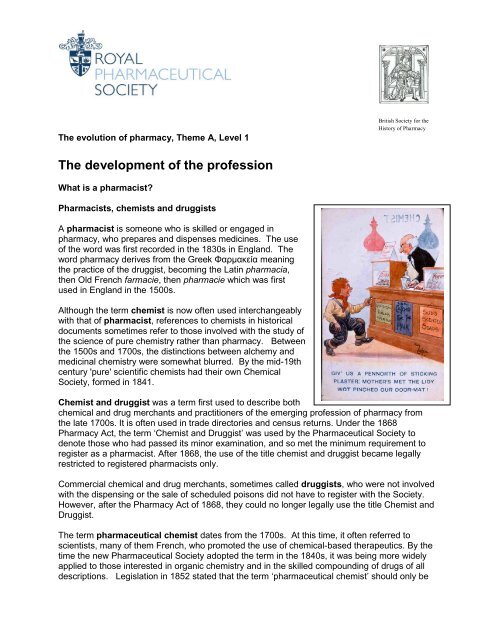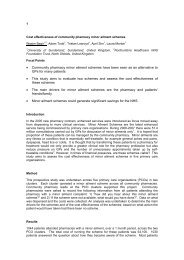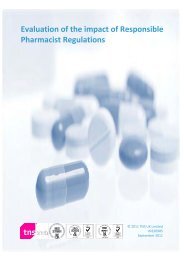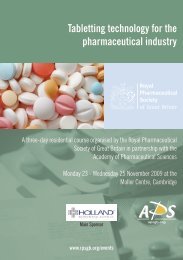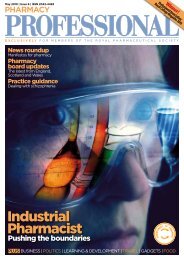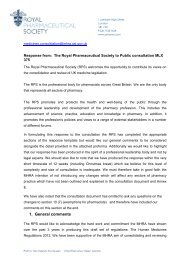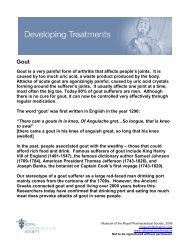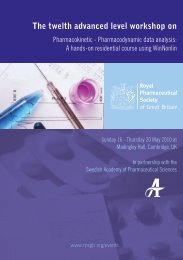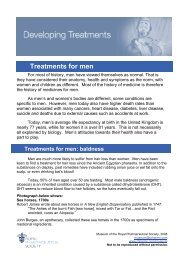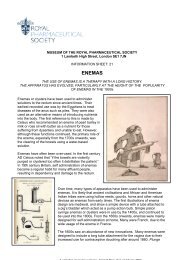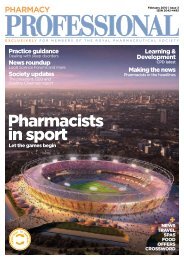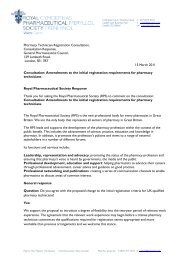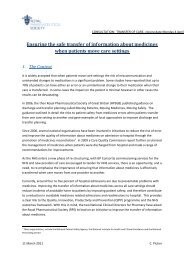The development of the profession - Royal Pharmaceutical Society
The development of the profession - Royal Pharmaceutical Society
The development of the profession - Royal Pharmaceutical Society
Create successful ePaper yourself
Turn your PDF publications into a flip-book with our unique Google optimized e-Paper software.
<strong>The</strong> evolution <strong>of</strong> pharmacy, <strong>The</strong>me A, Level 1<br />
British <strong>Society</strong> for <strong>the</strong><br />
History <strong>of</strong> Pharmacy<br />
<strong>The</strong> <strong>development</strong> <strong>of</strong> <strong>the</strong> pr<strong>of</strong>ession<br />
What is a pharmacist?<br />
Pharmacists, chemists and druggists<br />
A pharmacist is someone who is skilled or engaged in<br />
pharmacy, who prepares and dispenses medicines. <strong>The</strong> use<br />
<strong>of</strong> <strong>the</strong> word was first recorded in <strong>the</strong> 1830s in England. <strong>The</strong><br />
word pharmacy derives from <strong>the</strong> Greek Φαρμακεία meaning<br />
<strong>the</strong> practice <strong>of</strong> <strong>the</strong> druggist, becoming <strong>the</strong> Latin pharmacia,<br />
<strong>the</strong>n Old French farmacie, <strong>the</strong>n pharmacie which was first<br />
used in England in <strong>the</strong> 1500s.<br />
Although <strong>the</strong> term chemist is now <strong>of</strong>ten used interchangeably<br />
with that <strong>of</strong> pharmacist, references to chemists in historical<br />
documents sometimes refer to those involved with <strong>the</strong> study <strong>of</strong><br />
<strong>the</strong> science <strong>of</strong> pure chemistry ra<strong>the</strong>r than pharmacy. Between<br />
<strong>the</strong> 1500s and 1700s, <strong>the</strong> distinctions between alchemy and<br />
medicinal chemistry were somewhat blurred. By <strong>the</strong> mid-19th<br />
century 'pure' scientific chemists had <strong>the</strong>ir own Chemical<br />
<strong>Society</strong>, formed in 1841.<br />
Chemist and druggist was a term first used to describe both<br />
chemical and drug merchants and practitioners <strong>of</strong> <strong>the</strong> emerging pr<strong>of</strong>ession <strong>of</strong> pharmacy from<br />
<strong>the</strong> late 1700s. It is <strong>of</strong>ten used in trade directories and census returns. Under <strong>the</strong> 1868<br />
Pharmacy Act, <strong>the</strong> term ‘Chemist and Druggist’ was used by <strong>the</strong> <strong>Pharmaceutical</strong> <strong>Society</strong> to<br />
denote those who had passed its minor examination, and so met <strong>the</strong> minimum requirement to<br />
register as a pharmacist. After 1868, <strong>the</strong> use <strong>of</strong> <strong>the</strong> title chemist and druggist became legally<br />
restricted to registered pharmacists only.<br />
Commercial chemical and drug merchants, sometimes called druggists, who were not involved<br />
with <strong>the</strong> dispensing or <strong>the</strong> sale <strong>of</strong> scheduled poisons did not have to register with <strong>the</strong> <strong>Society</strong>.<br />
However, after <strong>the</strong> Pharmacy Act <strong>of</strong> 1868, <strong>the</strong>y could no longer legally use <strong>the</strong> title Chemist and<br />
Druggist.<br />
<strong>The</strong> term pharmaceutical chemist dates from <strong>the</strong> 1700s. At this time, it <strong>of</strong>ten referred to<br />
scientists, many <strong>of</strong> <strong>the</strong>m French, who promoted <strong>the</strong> use <strong>of</strong> chemical-based <strong>the</strong>rapeutics. By <strong>the</strong><br />
time <strong>the</strong> new <strong>Pharmaceutical</strong> <strong>Society</strong> adopted <strong>the</strong> term in <strong>the</strong> 1840s, it was being more widely<br />
applied to those interested in organic chemistry and in <strong>the</strong> skilled compounding <strong>of</strong> drugs <strong>of</strong> all<br />
descriptions. Legislation in 1852 stated that <strong>the</strong> term ‘pharmaceutical chemist’ should only be
used by people who had passed <strong>the</strong> <strong>Society</strong>’s 'major' examination, or by certain unexamined<br />
members <strong>of</strong> <strong>the</strong> <strong>Pharmaceutical</strong> <strong>Society</strong> who owned <strong>the</strong>ir own businesses. A ‘Register <strong>of</strong><br />
<strong>Pharmaceutical</strong> Chemists’ was compiled, but not published, from 1852 onwards. <strong>The</strong> term<br />
<strong>Pharmaceutical</strong> Chemist was retained after 1868, when registration became compulsory.<br />
Apo<strong>the</strong>caries and dispensers<br />
<strong>The</strong> term apo<strong>the</strong>cary, <strong>of</strong>ten used between <strong>the</strong> 1600s and 1800s, does not refer to <strong>the</strong> chemist<br />
and druggist. It was used for individuals living in London who had passed <strong>the</strong> examinations <strong>of</strong><br />
<strong>the</strong> Worshipful <strong>Society</strong> <strong>of</strong> Apo<strong>the</strong>caries <strong>of</strong> London, founded in<br />
1617, or to <strong>the</strong>ir <strong>of</strong>ten less well qualified counterparts in <strong>the</strong><br />
provinces. Although <strong>the</strong> apo<strong>the</strong>cary's practice included a<br />
strong dispensing element, it was more all-encompassing<br />
than <strong>the</strong> handling <strong>of</strong> drugs and chemicals. Following a ruling<br />
in <strong>the</strong> Rose Case (1701-1703/4), apo<strong>the</strong>caries became<br />
legally ratified members <strong>of</strong> <strong>the</strong> medical pr<strong>of</strong>ession, able to<br />
prescribe as well as dispense medicines.<br />
Under <strong>the</strong> Apo<strong>the</strong>caries Act <strong>of</strong> 1815, apo<strong>the</strong>caries who took a<br />
specified course <strong>of</strong> training with <strong>the</strong> Worshipful <strong>Society</strong> <strong>of</strong><br />
Apo<strong>the</strong>caries could be licensed as general practitioners, and<br />
were called licentiates. From 1815 onwards, it was illegal to<br />
use <strong>the</strong> title apo<strong>the</strong>cary without qualifying as a licentiate.<br />
Licentiates practised in London and <strong>the</strong> provinces. <strong>The</strong><br />
establishment <strong>of</strong> <strong>the</strong> General Medical Council in 1858, and<br />
growth in University training courses for medical students in<br />
<strong>the</strong> later 1800s, reduced <strong>the</strong> significance <strong>of</strong> <strong>the</strong> <strong>Society</strong> <strong>of</strong><br />
Apo<strong>the</strong>caries in <strong>the</strong> training <strong>of</strong> general practitioners.<br />
Non-pr<strong>of</strong>essional trained dispensers were employed by doctors and pharmacists, and also in<br />
institutions such as hospitals, asylums, workhouses, prisons and barracks. <strong>The</strong>y were trained<br />
assistants who compounded prescriptions under supervision. From 1815 onwards, <strong>the</strong> <strong>Society</strong><br />
<strong>of</strong> Apo<strong>the</strong>caries <strong>of</strong>fered an assistants' examination qualifying candidates to compound and<br />
dispense drugs under <strong>the</strong> supervision <strong>of</strong> an apo<strong>the</strong>cary, pharmacist or doctor. Relatively small<br />
numbers <strong>of</strong> people actually took <strong>the</strong> exams. Also, not all dispensers had qualified as Assistants<br />
through <strong>the</strong> <strong>Society</strong> <strong>of</strong> Apo<strong>the</strong>caries.<br />
FIND OUT MORE<br />
Links to o<strong>the</strong>r sheets:<br />
<strong>The</strong>me B: History <strong>of</strong> <strong>the</strong> <strong>Pharmaceutical</strong> <strong>Society</strong><br />
Fur<strong>the</strong>r reading:<br />
Holloway, S W F, <strong>The</strong> <strong>Royal</strong> <strong>Pharmaceutical</strong> <strong>Society</strong> <strong>of</strong> Great Britain: A political and social<br />
history, 1841-1991, (<strong>Pharmaceutical</strong> Press, London, 1991)<br />
O<strong>the</strong>r resources:<br />
Museum <strong>of</strong> <strong>the</strong> <strong>Royal</strong> <strong>Pharmaceutical</strong> <strong>Society</strong> Information Sheet: Tracing people and premises<br />
in pharmacy


